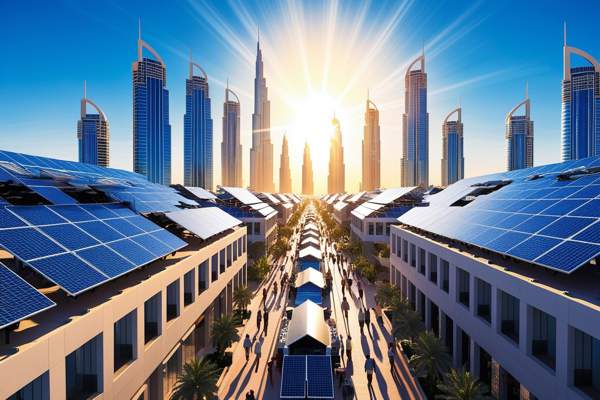
The Promise and the Path Ahead
Dubai's commitment to solar energy represents a significant step towards a sustainable future, driven by its abundant sunshine and a forward-thinking leadership. The ambitious goals set for renewable energy integration, exemplified by projects like the Mohammed bin Rashid Al Maktoum Solar Park, showcase the immense potential for solar power in the emirate. However, the journey towards widespread adoption is not without its complexities. Navigating the unique challenges posed by the desert environment, integrating new technologies into existing infrastructure, and ensuring economic viability require careful planning, continuous innovation, and a collaborative effort from all stakeholders. Understanding both the opportunities and the obstacles is crucial for charting a successful course towards a solar-powered future for Dubai.
Overcoming Environmental Hurdles
Dubai's desert climate, while offering a significant advantage in terms of solar irradiance, also presents unique environmental challenges for solar energy infrastructure. Extreme temperatures can impact the efficiency and lifespan of solar panels, while frequent dust storms can significantly reduce energy generation by obscuring panel surfaces. Addressing these issues requires ongoing research and development into durable and high-performance solar technologies specifically designed for harsh desert conditions. Furthermore, the implementation of effective and cost-efficient cleaning mechanisms for solar panels is essential to maintain optimal energy output. Water scarcity, another characteristic of the region, also necessitates careful consideration of water usage in solar power plant operations, particularly for cooling systems associated with concentrated solar power technologies.
Integrating Technology and Infrastructure
The widespread adoption of solar energy requires seamless integration with Dubai's existing power grid and energy infrastructure. This includes upgrading grid capacity to accommodate the intermittent nature of solar power generation and investing in smart grid technologies for efficient energy management and distribution. Energy storage solutions, such as batteries, are also crucial for ensuring a reliable power supply, especially during periods of low solar irradiance or peak demand. Moreover, the integration of rooftop solar installations into the urban landscape necessitates standardized regulations, streamlined permitting processes, and skilled workforce capable of handling installation and maintenance. Ensuring interoperability and grid stability while transitioning to a more decentralized energy system presents both technical and logistical challenges that require careful planning and investment.
While the long-term environmental benefits of solar energy are clear, ensuring its economic viability and attracting sufficient investment are critical for widespread adoption. The initial capital costs associated with solar projects can be substantial, and the economic competitiveness of solar power compared to traditional energy sources is influenced by factors such as government incentives, technological advancements, and fuel prices. Creating a stable and attractive investment environment for solar energy projects requires clear policy frameworks, long-term energy strategies, and innovative financing mechanisms. Public-private partnerships can play a vital role in mobilizing the necessary capital and expertise to drive the growth of the solar energy sector in Dubai.
Public Awareness and Engagement
The successful transition to a solar-powered future also depends on public awareness, acceptance, and active participation. Educating residents and businesses about the benefits of solar energy, including cost savings and environmental advantages, is crucial for encouraging the adoption of rooftop solar and supporting larger-scale projects. Streamlined application processes, accessible financing options, and clear information about grid connectivity can further incentivize individuals and organizations to embrace solar power. Fostering a sense of collective responsibility and highlighting the role of solar energy in achieving Dubai's sustainability goals can contribute to a broader societal shift towards clean energy adoption.
Despite the challenges, Dubai's pursuit of widespread solar adoption presents significant opportunities for innovation and global leadership. The unique environmental conditions of the region can drive the development of cutting-edge solar technologies and solutions tailored for harsh climates, potentially creating new export opportunities. Dubai's ambitious projects and strategic initiatives can serve as a model and source of inspiration for other cities and regions seeking to transition to clean energy. By embracing innovation in areas such as energy storage, smart grids, and sustainable urban development, Dubai can solidify its position as a global leader in the renewable energy sector and contribute to a more sustainable future for the planet.